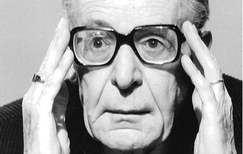m (→Henri Guillemin) |
m |
||
| Line 14: | Line 14: | ||
In an introduction of one his talk ("[http://www.youtube.com/watch?v=dMGNcmx_bEg la Commune de Paris]), interpreting a citation from [http://en.wikipedia.org/wiki/Victor_Hugo Victor Hugo], he makes this analysis that characterises quite well his approach to the duty of the historian: | In an introduction of one his talk ("[http://www.youtube.com/watch?v=dMGNcmx_bEg la Commune de Paris]), interpreting a citation from [http://en.wikipedia.org/wiki/Victor_Hugo Victor Hugo], he makes this analysis that characterises quite well his approach to the duty of the historian: | ||
| − | :''L'objectivité dont on parle toujours en histoire, ça n'est pas possible. Pourquoi? Objectivité, ça veut dire considérer les faits comme des objets. Ben comment voulez vous que l'on considère comme des objets une histoire humaine, une aventure humaine, quelque chose qui nous concerne tous. Alors je dirais que l'impassibilité est impossible, [...] mais si l'impassibilité est impossible, la loyauté est le premier devoir. Alors c'est ce que je vais essayer de faire, hein, une histoire véridique, de vous dire la vérité, de ne pas vous cacher ce qui peut me géner dans cette histoire là, qui n'est certes pas toujours belle, mais enfin en m'appliquant à être avant tout honnête.'' <wz tip=" | + | :''L'objectivité dont on parle toujours en histoire, ça n'est pas possible. Pourquoi? Objectivité, ça veut dire considérer les faits comme des objets. Ben comment voulez vous que l'on considère comme des objets une histoire humaine, une aventure humaine, quelque chose qui nous concerne tous. Alors je dirais que l'impassibilité est impossible, [...] mais si l'impassibilité est impossible, la loyauté est le premier devoir. Alors c'est ce que je vais essayer de faire, hein, une histoire véridique, de vous dire la vérité, de ne pas vous cacher ce qui peut me géner dans cette histoire là, qui n'est certes pas toujours belle, mais enfin en m'appliquant à être avant tout honnête.'' <wz tip="Objectivity, of which one speaks all the time when talking about History, that is not possible. Why not? Objectivity, that means to consider facts like objects. But how do you imagine to consider as objects a human history, a human adventure, something that concerns all of us? So, I would say that impassivity is impossible [...] but if impassivity is not possible, loyalty is the first duty. So, that is what I will try to do, a true story, to tell you the true story, not to conceal what could bother me in this story, that is not always pretty, but at least I will strive to be, before anything else, honest.">(en)</wz> |
You can listen the original in context, including the said quotation from Victor Hugo and two others equally interesting from [http://en.wikipedia.org/wiki/Fran%C3%A7ois-Ren%C3%A9_de_Chateaubriand Chateaubriand] and [http://en.wikipedia.org/wiki/Simone_Weil Simone Weil]. This will also give you an idea of the voluptuous tone of his narration: | You can listen the original in context, including the said quotation from Victor Hugo and two others equally interesting from [http://en.wikipedia.org/wiki/Fran%C3%A7ois-Ren%C3%A9_de_Chateaubriand Chateaubriand] and [http://en.wikipedia.org/wiki/Simone_Weil Simone Weil]. This will also give you an idea of the voluptuous tone of his narration: | ||
Revision as of 23:35, 8 December 2012
Contents |
Henri Guillemin
Henri Guillemin (1903—1992) was a French historian, renowned for his conferences broadcast on TV where he excelled as an orator of great conviction.
He is remarkable for his original historical research, based on a comprehensive and detailed analysis of documents rather than on a repeat of the official version, therefore often coming to opposite conclusions with those commonly accepted (particularly regarding Napoléon, Robespierre, ...), though not always (Dreyfus, Pétain, ...)
He was also a dedicated and committed researcher. For instance, he took over latin to study the five volumes of Jules Quicherat (!?) for his study on Jeanne d'Arc~[1].
He was a prolific author with some 63 books published.
Thanks to what we would now call his "videos", some of this material, including his original research, survived the oblivion it would have fallen into despite the considerable literary production. This is something to keep in mind for whoever is publishing nonfiction.
In an introduction of one his talk ("la Commune de Paris), interpreting a citation from Victor Hugo, he makes this analysis that characterises quite well his approach to the duty of the historian:
- L'objectivité dont on parle toujours en histoire, ça n'est pas possible. Pourquoi? Objectivité, ça veut dire considérer les faits comme des objets. Ben comment voulez vous que l'on considère comme des objets une histoire humaine, une aventure humaine, quelque chose qui nous concerne tous. Alors je dirais que l'impassibilité est impossible, [...] mais si l'impassibilité est impossible, la loyauté est le premier devoir. Alors c'est ce que je vais essayer de faire, hein, une histoire véridique, de vous dire la vérité, de ne pas vous cacher ce qui peut me géner dans cette histoire là, qui n'est certes pas toujours belle, mais enfin en m'appliquant à être avant tout honnête. (en)
You can listen the original in context, including the said quotation from Victor Hugo and two others equally interesting from Chateaubriand and Simone Weil. This will also give you an idea of the voluptuous tone of his narration:
Guillemin's videos
They are in French. The partial list below are some of my favourites:
Napoléon
|
|
|
Victor Hugo
Jeanne d'Arc
Others
Other videos of particular interest:
- Confidences de Henri Guillemin, Guillemin on himself.
- Henri Guillemin intime, another interview on his life and work. There he makes this stunning comment.
